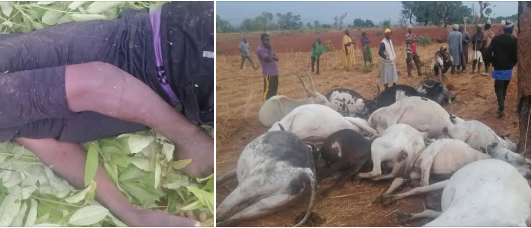
Tragic Lightning Strike: Cow Herder and 12 Cows Killed in Southern Kaduna

In a heart-wrenching turn of events, a tragic lightning strike has claimed the lives of a cow herder and at least 12 of his cattle in the southern region of Kaduna State, Nigeria.
The incident, which occurred amidst the rainy season, has left both the local community and the larger agricultural industry reeling. Lightning, though a natural occurrence, is a rare and devastating force, particularly when it takes the lives of both humans and livestock.
This story not only highlights the destructive power of nature but also underscores the precarious livelihoods of farmers and herders in rural Nigeria.
According to reports from the region, the tragedy unfolded when a powerful lightning bolt struck a field in southern Kaduna, killing the cow herder and at least 12 cows that were grazing nearby.
The herder, whose identity has not been officially revealed, was tending to his cattle during a particularly stormy afternoon when the lightning struck.
The suddenness of the event left no room for escape or intervention, as the lightning struck with such force that it instantly killed both the herder and the animals.
The impact of the lightning was so intense that it immediately rendered the cattle lifeless.
The herder, who was reportedly in close proximity to the animals at the time of the strike, suffered the same fate.
Eyewitnesses have described the scene as one of chaos and disbelief, with the herder’s family and fellow villagers rushing to the site to confirm the unimaginable loss.
The herder’s family, who depended heavily on the cattle for their livelihood, is devastated by the loss. Cattle farming and herding are integral to the socio-economic structure of many rural Nigerian communities, especially in northern and central regions like Kaduna.
Losing such a large number of cattle in one tragic event is not only emotionally devastating but also financially catastrophic for families who rely on their livestock for food, income, and social standing.
Southern Kaduna, known for its agrarian economy, is home to many farmers and herders who rely on livestock as a primary source of income.
Cattle, goats, and sheep are vital assets for rural communities, providing food, transportation, and even acting as a form of currency in certain traditional settings. Cattle are particularly important, as they also play a significant role in ceremonial exchanges and are considered a status symbol.
For the herder in this tragic case, the death of 12 cows represents a significant financial blow.
In many rural areas of Nigeria, a single cow can be worth thousands of Naira, depending on its breed, age, and condition. The loss of so many cattle in one fell swoop is more than just a loss of income—it’s the destruction of a vital part of the family’s wealth and livelihood.
Furthermore, the herder’s ability to provide for his family is compromised, as cattle are often used for breeding and trading purposes. The death of these cows leaves the family without a source of income and potentially disrupts the delicate balance of their financial and social ecosystem.
Lightning strikes, while rare, are an inevitable part of nature, especially during the rainy season when thunderstorms are common. Nigeria, being a tropical country with frequent rainfall and electrical storms, sees its fair share of lightning-related fatalities. However, this tragic incident highlights how unpredictable and devastating lightning strikes can be, particularly when they occur in rural areas far from emergency response teams.
Lightning strikes often occur without warning, and their destructive power can cause significant damage to both humans and animals. The sudden and powerful strike that killed the herder and his cattle is a stark reminder of how fragile life can be in regions that lack sufficient infrastructure and emergency services. Rural communities, such as those in southern Kaduna, may not have the resources to protect themselves from the dangers of nature’s unpredictability.
In many cases, farmers and herders have little to no protection from lightning strikes while working in open fields, which makes them vulnerable to such incidents. There are also few government initiatives or insurance schemes in place to help farmers and herders recover from such losses, leaving them with no recourse for the death of livestock or a family member in the event of a lightning strike.
The loss of a cow herder and 12 cows is not only a personal tragedy for the family but also a significant blow to the local community. In rural Nigerian villages, people often live in close-knit communities where the death of one person can impact many others. The herder’s family is well-known and respected in the village, and their loss reverberates through the community.
In addition to the emotional toll, the community also faces economic challenges. The sudden loss of so many cattle may impact local markets where livestock is bought and sold. Additionally, the herder’s family would have provided services such as animal care, breeding, and trade, all of which are now disrupted. The absence of this livelihood may create a ripple effect, as others in the community who relied on the herder’s cattle for income or trade may also face difficulties.
While lightning strikes are not an everyday occurrence, their impact on farming and herding communities in Nigeria can be catastrophic. Agricultural insurance is not widespread in many rural areas, and without such coverage, farmers and herders are left to bear the full financial weight of these kinds of accidents. For those who live in poverty or near-poverty conditions, a single lightning strike can decimate a year’s worth of hard work, and the cost of rebuilding a herd or farm can be prohibitive.
This incident also highlights the need for more comprehensive disaster preparedness strategies, especially for rural communities. Although there is little that can be done to prevent lightning, measures could be taken to ensure that herders and farmers have access to warning systems, insurance programs, and financial assistance in the event of natural disasters. These measures would help mitigate the financial impact of such tragic incidents and provide support to those who rely on farming and herding for their livelihood.
The tragic death of a cow herder and his 12 cattle in southern Kaduna serves as a powerful reminder of the unpredictable and often devastating effects of nature. Lightning, while a natural phenomenon, has the potential to cause untold loss, particularly for those whose livelihoods depend on livestock. This incident underscores the vulnerability of rural farmers and herders in Nigeria, who are often at the mercy of both the elements and the lack of social safety nets.
For the family of the deceased herder, this loss is immeasurable. Their livelihood has been stolen by a force they could neither anticipate nor prevent. As for the broader community, the death of the herder and his cattle is both a personal and financial blow, impacting the local economy and social structure. It’s a tragedy that highlights the need for more support for rural communities, whether through disaster preparedness, insurance coverage, or emergency response systems, to help mitigate the impact of natural disasters and ensure that people can recover from such unforeseen tragedies.


